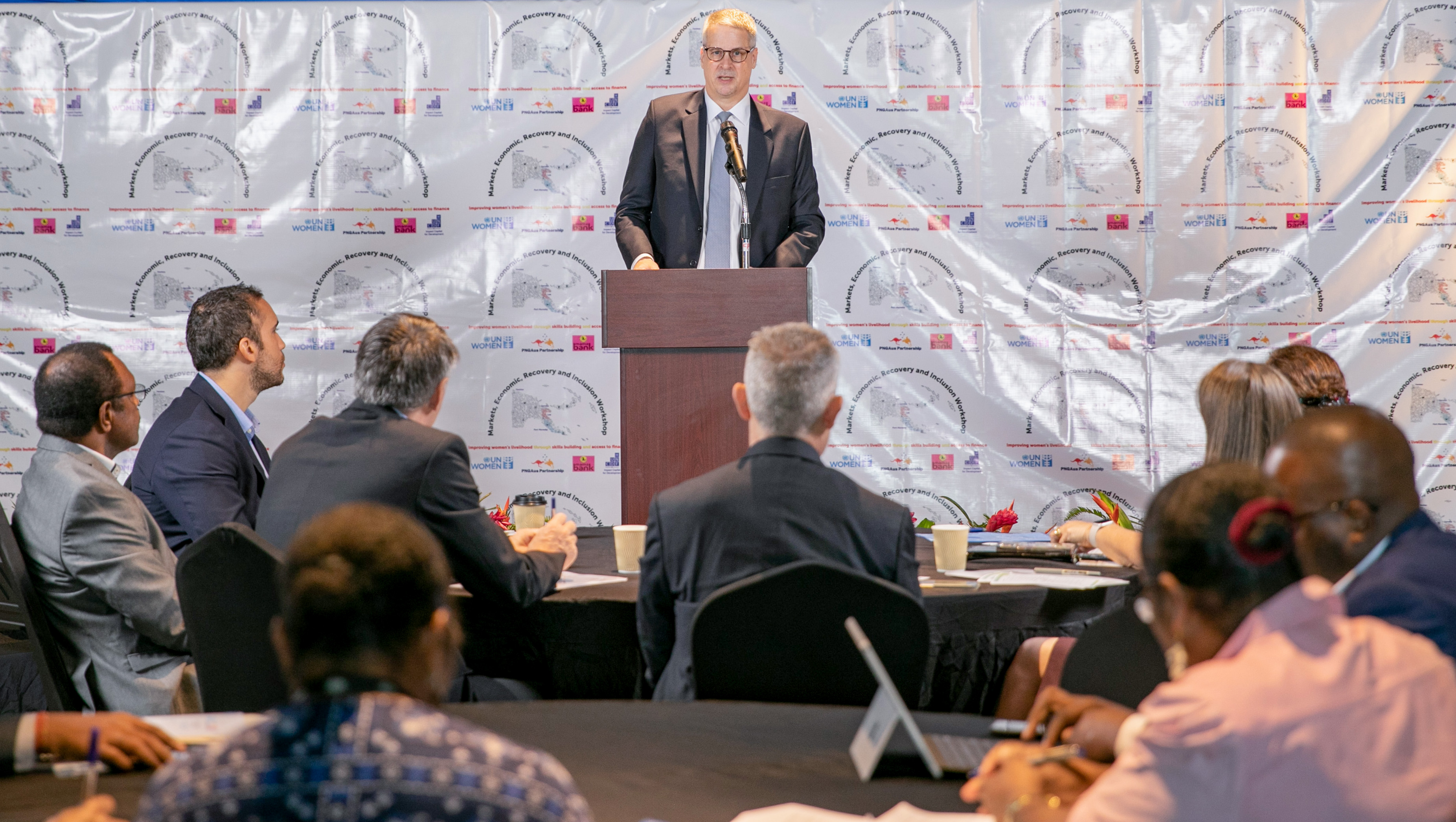Remarks by Mr. Dirk Wagener UNDP Resident Representative at the occasion of Markets, Economic, Recovery and Inclusion Workshop, June 20 2023, Apec Haus
June 20, 2023

Mr. Dirk Wagener giving his opening remarks.
Salutations:
- Acting Governor for Bank of Papua New Guinea: Ms. Elizabeth Genia
- SME Corporation representative
- Excellencies;
- European Union Ambassador Mr. Jacques Fradin
- Australian High Commission representative
- New Zealand High Commission representative
- Development Partners
- United Nations Resident Coordinator
- UN Women representative
- Financial Institutions representatives
- Mobile network operators and Members of the Media
- Na ol gutpela mama bilong yumi long Gordons Market, Welkam long yupela olgeta, long dispela bikpela bung.
Monin/Apinun Tru Olgeta
Economic impact of COVID-19 on women in Papua New Guinea.
Ladies and gentlemen, I am extremely privileged to discuss the economic impact of COVID-19 on Papua New Guinea, with a specific focus on women. It is essential to acknowledge the unique challenges faced by women in the wake of this unprecedented crisis and recognize the immediate and long-term implications it holds for their economic well-being.
In the words of Nada Marković, from Bosnia and Herzegovina, who works with the organization "Maja Kravica”, which seeks to empower women from rural communities:
“Far away from the capital, women don’t have many job opportunities. They have to create opportunities for themselves to become breadwinners. We support them in making their own decisions, developing their own business plans, facilitating their access to capital, financial services, goods and equipment. As they build their businesses, they also build their confidence and can exercise their rights better.
These words touch on what makes women’s economic empowerment and financial inclusion critical for gender equality.
Immediate Challenges:
The COVID-19 pandemic has disproportionately affected women in Papua New Guinea, exacerbating existing gender inequalities. The immediate challenges stemming from the crisis include:
a) Loss of livelihoods: Many women in Papua New Guinea work in sectors heavily impacted by the pandemic, such as informal trade, retail, and hospitality. The closure of businesses reduced economic activity, and job losses have left countless women without a source of income.
b) Increased caregiving responsibilities: With the closure of schools and childcare facilities, women have taken on additional caregiving responsibilities for their families, including children, elderly parents, and sick relatives. Balancing work and caregiving duties has become increasingly challenging, impacting their ability to participate fully in the workforce.
c) Limited access to healthcare: The pandemic has strained healthcare systems, making it harder for women to access essential reproductive health services, including antenatal and postnatal care. Limited access to healthcare exacerbates existing health disparities and poses risks to women's well-being.
Long-Term Implications:
Beyond the immediate challenges, we must also consider the long-term implications of the COVID-19 crisis on women in Papua New Guinea. These implications include:
a) Widening gender disparities: The pandemic has the potential to widen existing gender disparities, including income inequality, access to education, and decision-making power. Disruptions in education due to school closures may disproportionately impact girls, leading to increased dropout rates and reduced opportunities for their future.
b) Increased vulnerability to poverty: The economic downturn resulting from the pandemic may push more women into poverty. Women who rely on informal work or are engaged in the informal sector face a higher risk of financial insecurity and limited access to social protection measures.
c) Limited access to finance and resources: Women entrepreneurs, particularly those in the informal sector, face challenges accessing formal financial services, such as credit and savings facilities. The pandemic's impact on the banking sector and the economy at large may further impede women's access to finance and resources necessary for business recovery and growth.
Addressing the Challenges:
To mitigate the economic impact of COVID-19 on women in Papua New Guinea, it is imperative that we undertake targeted actions and policies. This includes:
a) Strengthening social protection: Implementing comprehensive social protection programs that specifically address the needs of women and provide support during economic crises. This may include income support, childcare services, and healthcare provisions.
b) Promoting women's entrepreneurship: Facilitating access to finance, business training, and mentorship programs to empower women entrepreneurs and enable them to rebuild and sustain their businesses.
c) Enhancing digital literacy and connectivity: Investing in digital infrastructure and promoting digital literacy among women will enable them to participate in the digital economy, access online resources, and explore new business opportunities.
d) Ensuring gender-responsive recovery plans: Integrating a gender lens into recovery plans and policies to address the unique needs and challenges faced by women. This includes promoting women's participation in decision-making processes and leadership roles.
Tenk yu tru.
"To mitigate the economic impact of COVID-19 on women in Papua New Guinea, it is imperative that we undertake targeted actions and policies."UNDP Resident Representative, Mr. Dirk Wagener

 Locations
Locations



